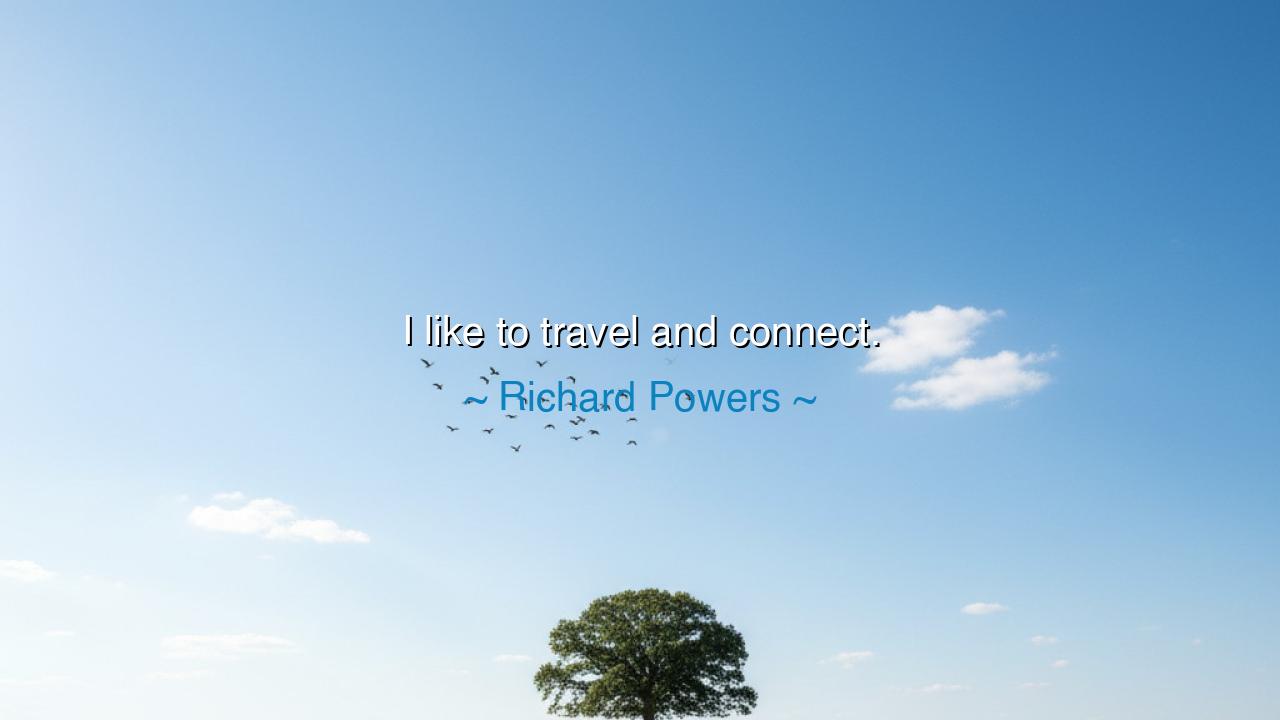
I like to travel and connect.






Richard Powers, the weaver of stories and seeker of truth, once declared with disarming simplicity: “I like to travel and connect.” Yet beneath this modest confession lies a wisdom profound and enduring. For to travel is to move not only across the surface of the earth, but also across the vastness of the human spirit. And to connect is to bind oneself to others, to see the unity of all lives, and to affirm that the world is not a scattered multitude of strangers, but a single great family of souls.
The origin of this saying lies in Powers’s life as a novelist, one whose works stretch across science, history, and the hidden threads of human destiny. His journeys—whether through landscapes of thought or the physical landscapes of the earth—were never for spectacle alone. They were quests for understanding, for communion with people, places, and stories. When he said he likes to travel and connect, he revealed the guiding principle of his art: movement that is not aimless, and connection that is not shallow, but the deliberate pursuit of meaning through encounter.
This idea is as old as civilization itself. The ancients knew that to travel was not merely to wander, but to seek wisdom. The Greek hero Odysseus, though tossed by storm and war, was shaped by his encounters with the strange and the foreign. He connected with kings and beggars, gods and monsters, learning from each, until at last he knew both himself and the world more fully. Likewise, when the Buddha journeyed from his palace into the streets, he encountered sickness, age, and death, and from those connections drew the wisdom that birthed his path of compassion. Travel without connection is tourism; travel with connection is transformation.
History abounds with examples. Consider Marco Polo, who left Venice not only to cross deserts and mountains, but to meet emperors and artisans, traders and monks. Through his willingness to connect, he became a bridge between East and West, carrying knowledge, stories, and inspiration that reshaped Europe. His journey proves that the act of traveling is not fulfilled until one reaches beyond oneself and embraces the lives of others. The road may take us to new lands, but connection takes us to new hearts.
Powers’s words also speak to the hunger of our age, when technology connects us in appearance but often leaves us isolated in truth. We scroll through images of distant places, yet we rarely touch the soil or hold the hands of strangers. To truly connect, one must be present, vulnerable, and attentive. It is not enough to visit a place—we must listen to it, honor it, and let its people and stories alter us. Real connection requires humility, the willingness to be changed by what we encounter.
The lesson is this: seek not only to travel, but to connect deeply wherever you go. When you journey to new lands, do not remain behind the walls of hotels or the surface of photographs. Share meals with locals, listen to their stories, and learn their customs. When you move through your own community, connect with neighbors, colleagues, and even strangers. For every soul is a world, and every encounter is a journey waiting to be taken. The greatest discovery of travel is not geography, but humanity.
In practice, this means living as a traveler even when at home. Approach every person as a land unexplored, every conversation as a crossing, every act of kindness as a bridge. Do not let life be a solitary road—fill it with companions, with shared laughter, with wisdom gleaned from others. For he who travels without connecting walks alone, but he who connects wherever he goes carries the whole world within him.
Thus Richard Powers’s words, though simple, shine as a beacon: “I like to travel and connect.” Let them remind us that our journeys are not meant to escape, but to embrace; not to withdraw, but to unite. To travel is to move through space; to connect is to move through hearts. And when both are joined, the traveler becomes more than a wanderer—he becomes a builder of bridges, a bearer of peace, and a witness to the oneness of all life.






AAdministratorAdministrator
Welcome, honored guests. Please leave a comment, we will respond soon